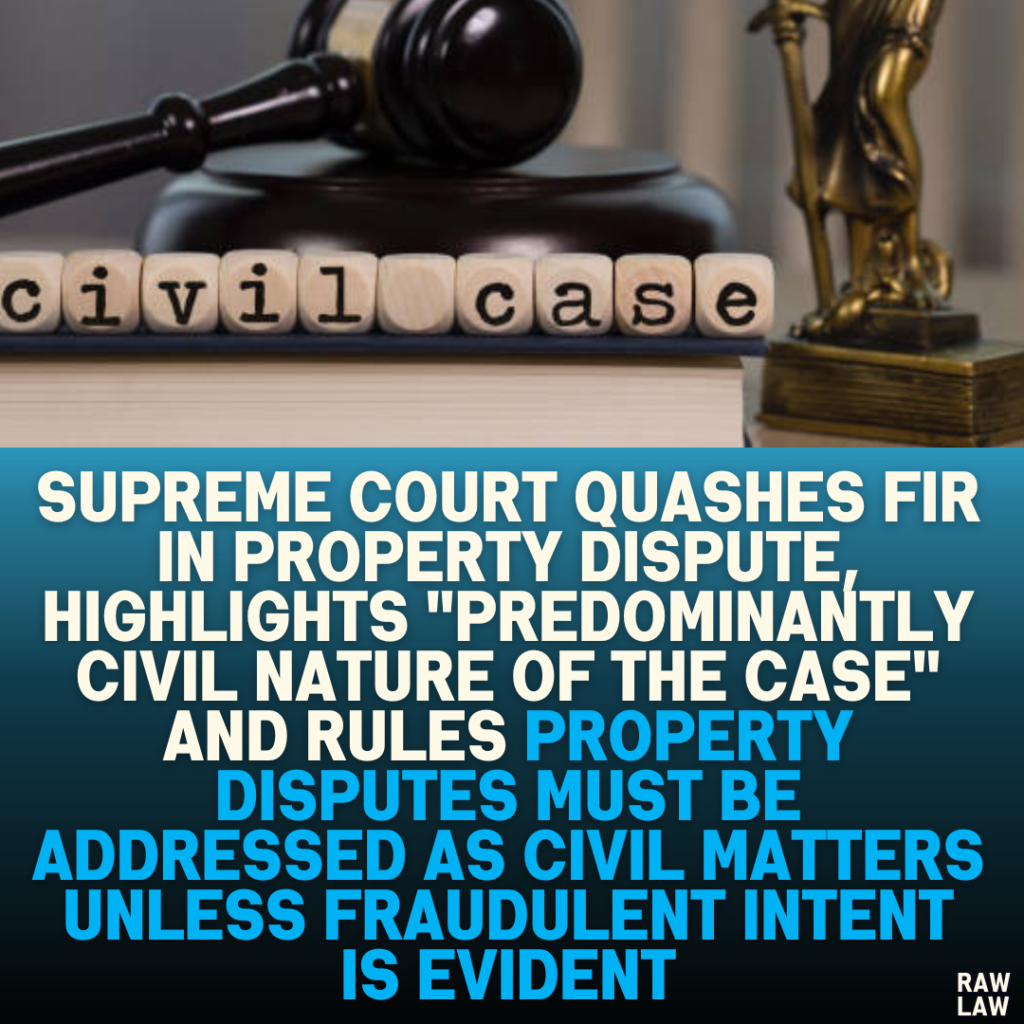Court’s Decision
The Supreme Court of India quashed an FIR filed against the appellant under Section 420 of the IPC, which alleged cheating in the sale of a disputed property in Goa. The Court held that the allegations arose from a civil dispute over property ownership and did not constitute a criminal offence. It ruled that the FIR was an abuse of the process of law, filed after a significant delay and while civil suits were already pending.
Facts
- The dispute concerns a property in Goa described as “CAPNIVORIL GUERA,” among other names, claimed by multiple parties.
- The appellant executed a sale deed as an attorney for two vendors, Vidhya Natekar and Sanjay Natekar, who claimed co-ownership of the property under the regime of the communion of assets applicable in Goa.
- The fourth respondent claimed co-ownership of the same property, asserting an undivided share inherited from his father. In 2018, he filed civil suits seeking a declaration of ownership and injunctions.
- In 2020, two years after filing the civil suits, the fourth respondent filed an FIR alleging that the appellant dishonestly sold the property without consent from all co-owners.
- The appellant challenged the FIR before the High Court, which dismissed his petition. The appeal was then brought before the Supreme Court.
Issues
- Did the appellant’s execution of the sale deed amount to the offence of cheating under Section 420 IPC?
- Should the criminal proceedings be allowed to continue given the ongoing civil litigation?
Petitioner’s Arguments
- No Criminal Offence: The appellant argued that the sale deed only transferred the rights and interests of the vendors and did not involve fraudulent or dishonest intent.
- Delay and Suppression: The complaint was filed two years after the initiation of civil suits, and the respondent failed to disclose the ongoing civil litigation in the FIR.
- No Deception or Harm: There was no evidence that the appellant deceived the fourth respondent or caused harm to his body, mind, property, or reputation.
- Civil Nature of Dispute: The appellant contended that the case was purely civil, emphasizing that disputes over property title cannot be equated to criminal offences.
Respondent’s Arguments
- Allegations of Misappropriation: The fourth respondent alleged that the appellant misappropriated the property by selling it without obtaining consent from all co-owners, including the respondent.
- No Bar on Criminal Proceedings: The respondent argued that ongoing civil suits do not preclude criminal action if the conduct constitutes an offence.
- Request for Investigation: The respondent relied on precedents to argue that quashing the FIR at an early stage would hinder the investigation.
Analysis of the Law
- Section 415 IPC: Cheating requires deception leading to fraudulent or dishonest inducement that causes harm or damage. The Court found no evidence of such deception by the appellant.
- Nature of the Dispute: The Court noted that disputes over property ownership and title typically fall under civil law unless clear fraudulent intent is demonstrated.
- Precedents:
- Mohd. Ibrahim v. State of Bihar: Executing a sale deed for disputed property does not amount to cheating or forgery unless the purchaser alleges fraud.
- R.K. Vijayasarathy v. Sudha Seetharam: A criminal complaint cannot be sustained if essential ingredients of the offence are absent.
- The Court highlighted that the complaint was not filed by the purchasers under the sale deed but by a third party, undermining claims of deception.
Precedent Analysis
- The Court distinguished between civil and criminal liability, emphasizing that civil disputes cannot be converted into criminal cases without evidence of fraud.
- It reaffirmed the principle that invoking criminal law to settle civil disputes constitutes an abuse of legal processes.
Court’s Reasoning
- Lack of Deception: The appellant acted within the authority granted under the power of attorney and did not deceive the fourth respondent.
- Civil Nature: The dispute over whether the vendors could sell the property was civil, not criminal. The Court noted that the appellant did not attempt to transfer the fourth respondent’s rights or misrepresent ownership.
- Abuse of Process: Filing the FIR two years after initiating civil suits and suppressing the fact of pending litigation indicated an attempt to misuse criminal law.
Conclusion
The Supreme
Court quashed the FIR and associated criminal proceedings against the appellant. It ruled that the allegations did not meet the legal requirements for cheating under Section 420 IPC and arose from a civil dispute over property ownership. The Court also clarified that its decision did not impact the pending civil suits regarding the ownership of the property.
Implications
The judgment reinforces the principle that criminal proceedings cannot be used to settle civil disputes. It emphasizes the need for clear evidence of fraudulent intent to invoke criminal law in property disputes. The decision protects individuals from facing criminal charges in cases where civil remedies are more appropriate, thus preventing the misuse of the criminal justice system.




Very helpful to the lawyer